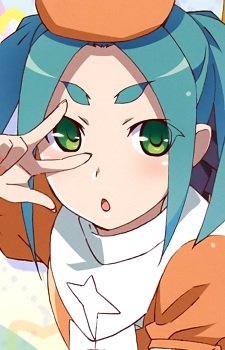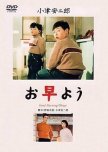Ozu's most accessible film; a great first film to start with
Yasujiro Ozu, along with his writing buddy, Kogo Noda, collaborated on 27 films. Ozu, alone, made 53 feature films. Good Morning was Ozu's 49th film, and 2nd film in color. This is one of his 'later' films.
Good Morning (1959) is easily one of the most accessible films for the new Ozu filmgoer. It is in audio, color, and, at 94 min. run time, very digestible. Compared to other Ozu films, it feels less 'heavy', quicker in pace, and is visually stimulating; older Ozu films (especially the black and white films) have a more static visual presentation. There's lots of explicit and implicit comedy in Good Morning, and the music is more 'modern' compared to earlier films. Furthermore, Good Morning leans heavily on the performance of children, including a cute young child who does an incredible acting job. There's something to like in this film for everyone. This is a fine film to watch for a family with children.
As with all Ozu films, this is a family drama. The plot and themes cover the dynamics of an upper middle class household (father, mother and their two young sons). The film also explores the dynamics of neighborhood relations and intergenerational dynamics. The challenges of raising children are explored as are the differences in socioeconomic statuses of neighbors. Compared to many other Ozu films, which focus on adult characters, Good Morning features well-developed children characters. The children actors in this film, in fact, steal the show.
The portrayal of happy-go-lucky children in Good morning, may be a symbolic decision. In 1959, Japan would have had young children (age 1-15) with little to no living memory of WWII. Instead, the children of Good Morning are concerned with television, watching sumo and baseball, and having fun with friends. The adult parents, conversely, are consumed with work and rebuilding the nation from its WWII defeat; they seem too busy to be strict with their children for long, giving in to demands for consumer pleasures.
While this film may not be as 'emotional' or as 'deep' as other Ozu films, it is still a very thought provoking film. For myself, personally, this film made me want to read more about Japan's modern history.
Good morning is a very good place to start for the first-time Ozu filmgoer and is appropriate for children of middle-school reading ability.
Good Morning (1959) is easily one of the most accessible films for the new Ozu filmgoer. It is in audio, color, and, at 94 min. run time, very digestible. Compared to other Ozu films, it feels less 'heavy', quicker in pace, and is visually stimulating; older Ozu films (especially the black and white films) have a more static visual presentation. There's lots of explicit and implicit comedy in Good Morning, and the music is more 'modern' compared to earlier films. Furthermore, Good Morning leans heavily on the performance of children, including a cute young child who does an incredible acting job. There's something to like in this film for everyone. This is a fine film to watch for a family with children.
As with all Ozu films, this is a family drama. The plot and themes cover the dynamics of an upper middle class household (father, mother and their two young sons). The film also explores the dynamics of neighborhood relations and intergenerational dynamics. The challenges of raising children are explored as are the differences in socioeconomic statuses of neighbors. Compared to many other Ozu films, which focus on adult characters, Good Morning features well-developed children characters. The children actors in this film, in fact, steal the show.
The portrayal of happy-go-lucky children in Good morning, may be a symbolic decision. In 1959, Japan would have had young children (age 1-15) with little to no living memory of WWII. Instead, the children of Good Morning are concerned with television, watching sumo and baseball, and having fun with friends. The adult parents, conversely, are consumed with work and rebuilding the nation from its WWII defeat; they seem too busy to be strict with their children for long, giving in to demands for consumer pleasures.
While this film may not be as 'emotional' or as 'deep' as other Ozu films, it is still a very thought provoking film. For myself, personally, this film made me want to read more about Japan's modern history.
Good morning is a very good place to start for the first-time Ozu filmgoer and is appropriate for children of middle-school reading ability.
Vond je deze recentie nuttig?







